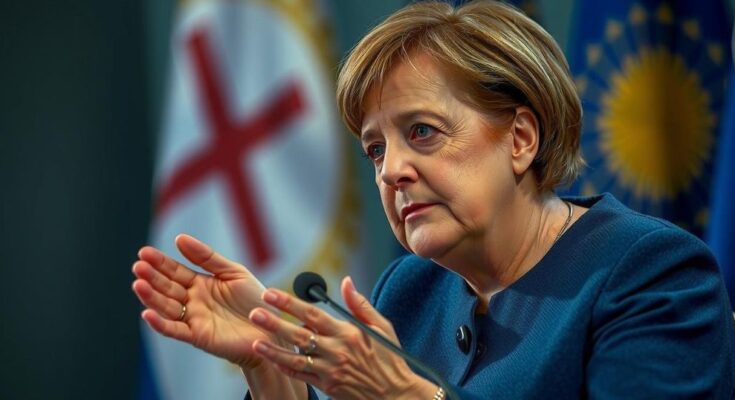Angela Merkel, in her new memoir “Freedom”, defends her sixteen-year leadership, addressing criticism over her refugee policy and ties to Russia. Amid current global turmoil, she reflects on her decisions, asserting that her approaches were necessary for Germany’s stability and growth, while also emphasizing the importance of dialogue in foreign relations.
Germany’s former Chancellor Angela Merkel has published her memoir entitled “Freedom: Memories 1954 – 2021,” offering a vigorous defense of her leadership over the past sixteen years. As the book launches in 30 languages, it arrives at a crucial time marked by geopolitical tensions, including ongoing wars in Ukraine and the Middle East. Merkel’s reflections include her controversial policies during the 2015 refugee crisis, which led to significant criticism over her open-door migration approach.
Merkel rebuffs accusations implying that her decisions led to the current challenges Germany faces, including its reliance on Russian energy. Despite the backlash regarding her ties with Russia and the outcomes of her immigration policies, she maintains that facilitating dialogue and understanding was pivotal. In her memoir, she elaborates on the complexities of her engagements with pivotal global figures, particularly highlighting her diplomatic encounters with Vladimir Putin and Donald Trump.
She insists that while external borders should be protected, Germany must also recognize the need for legal migration as a solution to demographic challenges. Furthermore, Merkel defends her decisions regarding energy imports from Russia, emphasizing the context of Germany’s energy transition efforts. She argues that although Germany’s current economic troubles stem from reduced access to Russian gas, her initial strategies were based on a need for stabilization amidst a transitioning energy landscape.
The publication of Angela Merkel’s memoir comes at a time of significant political unrest in Germany and beyond. Having served as Chancellor from 2005 to 2021, Merkel’s decisions during her tenure, particularly regarding energy, immigration, and foreign relations, have come under intense scrutiny. The enduring war in Ukraine has highlighted the implications of Germany’s dependence on Russian gas, a concern tied to Merkel’s policies. Through her memoir, Merkel seeks to clarify her positions and rationale behind her actions during her leadership, providing insights from both historical and personal perspectives.
In summation, Angela Merkel’s memoir “Freedom” serves as a comprehensive reflection on her 16 years in power amidst tumultuous events such as the refugee crisis and changing global relations. By defending her decisions and articulating the reasoning behind her policies, she aims to contribute to the ongoing discourse surrounding Germany’s political and economic landscape. Merkel’s narrative not only addresses past actions but also sheds light on the necessity of continued dialogue and cooperation in international relations, particularly with respect to migration and energy policy.
Original Source: jordantimes.com




